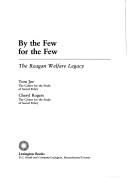| Listing 1 - 10 of 51 | << page >> |
Sort by
|
Book
Year: 1985 Publisher: Cambridge, Mass. National Bureau of Economic Research
Abstract | Keywords | Export | Availability | Bookmark
 Loading...
Loading...Choose an application
- Reference Manager
- EndNote
- RefWorks (Direct export to RefWorks)
This paper reviews the current policies for fighting poverty and explores the impact they have had. We begin by reviewing trends in poverty, poverty spending and economic performance. It is immediately apparent that economic performance is the dominant determinant of the measured poverty rate over the past two decades. Government assistance programs expanded greatly over this period, but the growth in cash assistance was too modest to have major effects, and the large growth in in-kind benefits could not reduce measured poverty since such benefits are not counted as income. Next we focus on three groups: the disabled, female family heads, and unemployed black youth. We find little evidence that government deserves the blame for the problems of each group, and suggest that the broad outlines of current policies are defensible on economic grounds.
Public welfare. --- Poverty --- United States.
Book
ISBN: 3486527614 3486824201 Year: 1985 Publisher: München Oldenbourg
Abstract | Keywords | Export | Availability | Bookmark
 Loading...
Loading...Choose an application
- Reference Manager
- EndNote
- RefWorks (Direct export to RefWorks)
Social policy --- Germany --- Community organization --- Public welfare

ISBN: 0669101672 Year: 1985 Publisher: Lexington (Mass.) : Lexington books,
Abstract | Keywords | Export | Availability | Bookmark
 Loading...
Loading...Choose an application
- Reference Manager
- EndNote
- RefWorks (Direct export to RefWorks)
Income maintenance programs --- Public welfare --- Case studies.
Book
Abstract | Keywords | Export | Availability | Bookmark
 Loading...
Loading...Choose an application
- Reference Manager
- EndNote
- RefWorks (Direct export to RefWorks)
Public welfare --- Aide sociale --- History --- Histoire
Periodical
Abstract | Keywords | Export | Availability | Bookmark
 Loading...
Loading...Choose an application
- Reference Manager
- EndNote
- RefWorks (Direct export to RefWorks)
Social service --- Public welfare --- Service social --- Aide sociale --- Public welfare. --- Social service. --- Canada.
Book
ISBN: 3811447858 Year: 1985 Publisher: Heidelberg : Müller,
Abstract | Keywords | Export | Availability | Bookmark
 Loading...
Loading...Choose an application
- Reference Manager
- EndNote
- RefWorks (Direct export to RefWorks)
Children --- Public welfare --- Legal status, laws, etc. --- Law and legislation
Periodical
Abstract | Keywords | Export | Availability | Bookmark
 Loading...
Loading...Choose an application
- Reference Manager
- EndNote
- RefWorks (Direct export to RefWorks)
Social service --- Public welfare --- Service social --- Aide sociale --- Canada.
Book
ISBN: 0899083137 Year: 1985 Publisher: Saint Paul Greenhaven press
Abstract | Keywords | Export | Availability | Bookmark
 Loading...
Loading...Choose an application
- Reference Manager
- EndNote
- RefWorks (Direct export to RefWorks)
Public welfare --- Social security --- United States --- Social policy.
Book
ISBN: 0716204096 Year: 1985 Publisher: London Epworth
Abstract | Keywords | Export | Availability | Bookmark
 Loading...
Loading...Choose an application
- Reference Manager
- EndNote
- RefWorks (Direct export to RefWorks)
Book
Year: 1985 Publisher: s'Gravenhage, Netherlands : Staatsuitgeverij,
Abstract | Keywords | Export | Availability | Bookmark
 Loading...
Loading...Choose an application
- Reference Manager
- EndNote
- RefWorks (Direct export to RefWorks)
Het huidige stelsel is sterk geënt op het model waarbij het gehele gezinsinkomen wordt verdiend door één kostwinner met een volledige baan. Dit model boet aan belang in en daarnaast kan de overheid geen volledige werkgelegenheid waarborgen. Dit vraagt om een stelsel waarin de band tussen uitkering en arbeid losser is dan nu. De sociale zekerheid wordt thans vooral gefinancierd door heffingen op arbeid, waardoor de relatieve prijzen van arbeidsintensieve goederen en diensten zijn gestegen, zodat de vraag naar deze producten nadelig wordt beïnvloed en verschuiving van formele naar informele productie in de hand wordt gewerkt. De werkgelegenheid neemt hierdoor af. De WRR komt met een aantal voorstellen. The current system is heavily based on the model in which the entire family income is earned by one breadwinner with a full job. This model has a negative impact on the government and the government can not guarantee full employment. This requires a system in which the link between benefit and work is looser than now. Social security is now mainly financed by taxes on labor, which has increased the relative prices of labor-intensive goods and services, so that the demand for these products is adversely affected and the shift from formal to informal production is encouraged. This reduces employment. The WRR comes with a number of proposals.
Social security --- Public welfare administration --- Government policy --- Netherlands --- Social policy.
| Listing 1 - 10 of 51 | << page >> |
Sort by
|

 Search
Search Feedback
Feedback About UniCat
About UniCat  Help
Help News
News